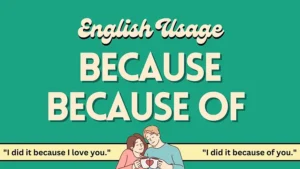“Because” vs. “Because of”: The Difference in Usage

Recommended level: Upper intermediate / Advanced
Is it “because that” or “because of that”? Read the common mistakes section at the bottom to find out.
Quick Reference
-
“Because” and “because of” are used for introducing the reason or reasons for something.
-
Typically, “Because” is a conjunction. “Because of” is a preposition.
-
“Because” is typically followed by a subject and a verb. (“He fell because he wasn’t paying attention.” / “We went to the pub because we were really hungry.”)
-
“Because of” is followed by a noun, noun phrase, gerund, gerund phrase, object pronoun, possessive adjective, or wh- clause. (“He fell because of a rock on the ground.” / “He’s upset because of what you said.”)
-
Informally, “because” can be used as a preposition followed by a noun, noun phrase, or gerund. (“Why did you do that?” “Because reasons.”)
-
“Because” can also be used as an interjection, often with “just.” (“Why did you do that?” “Just because!”)
-
Synonyms for “because” include “since,” “as,” and “due to the fact that.”
-
Synonyms for “because of” include “due to,” “as a result of,” “on account of,” and “as a consequence of.”
The word “because” answers the question “Why?” For instance:
“Why didn’t you text me?”
“Because I was busy.” (My busyness was the reason that I didn’t text you.)
“Why does she look so sad?”
“Because she lost her job.” (The reason for her sadness is the loss of her job.)
When we use “because,” we are concerned with the reason for something happening. It’s the same thing with “because of.” Take a look:
“Why was Dennis fired?”
“Because of his poor work ethic.” (The reason for Dennis’ firing was his poor work ethic.)
“Why did you leave early?”
“Because of an argument I had with Jenna.” (My argument with Jenna was the reason that I left early.)
So, what’s the difference between “because” and “because of”?
In short, the difference is this: In most cases, “because” is followed by a subject and a verb, and “because of” is typically followed by a single word or phrase. Here are two sentences with similar meanings, but with different structures to help illustrate this difference:
“The game was cancelled because the weather was bad”
“The game was cancelled because of bad weather.”
As you can see, “because” is followed by a subject and a verb which express a complete thought. In the case above, that thought is “the weather was bad.” On the other hand, “because of” is followed by a short phrase. In the case above, that phrase is “bad weather.”
Let’s look at two more examples:
“They won because they were more prepared than the other team.” (Once again, we have a complete thought after “because.” In this case, “they were more prepared than the other team.”)
“They won because of superior preparation.” (Once again, we have a short phrase: “superior preparation.”)
However, the sentences which follow “because,” and the words and phrases which follow “because of,” aren’t always so short and clean. Perhaps you have noticed my use of the adverb “typically” and the phrase “in most cases” on this page. Well, that’s because “because” and “because of” can be used in other types of situations. So, now that we understand the basic grammatical difference between “because” and “because of,” let’s take a look a closer look at them–and at a variety of example sentences and grammatical uses–one at a time.
Because

“I was late because…”
As we now know, “because” introduces a reason and is followed by a subject and a verb. It’s synonymous with the phrase “due to the fact that.” This is its most common usage. Let’s take a look at a handful of examples with this in mind, and pay attention to the fact that you can use “because” at the start or in the middle of a sentence:
“We delayed the launch because the product wasn’t ready.”
“Because the computer had become unbearably slow, we decided to recycle it and get a new one.”
“I stopped being friends with him because he wouldn’t stop complaining about everything.”
“We need someone to get our mail because we’re going to be on vacation for two weeks.”
“Because you have refused the promotion, we won’t be able to increase your salary until October.”
Okay, that’s not too bad right?
Now, before we continue, here is a quick note on using commas with “because”…
Typically, commas are not used before “because.” However, if the “because” portion of a sentence feels like extra information, a comma is possible. This is typically a choice of personal style. Let’s take a look:
Example 1: No comma
“I did it because I wanted to.” (“Because I wanted to” is an essential part of this sentence. It emphasizes the reason that “I did it.”)
Example 2: Comma
“There are still 500 tickets available for the show, because the studio didn’t promote it well.” (You could 100% remove the comma in this sentence if you want to emphasize the reason. However, if you just want to emphasize that there are still 500 tickets available and then give the reason as bonus information, you can use a comma.)
Okay, now let’s get back to using “because” in other ways.
Other Ways to Use “Because”
So far, we have looked at neat and tidy sentences with “because.” All of the examples we have seen so far have a subject right after “because” (“because we,” “because the computer,” “because the weather,” etc.). However, these are not the only structures which are possible. Indeed, you can follow “because” with the following structures as well (if you’re reading this, pay attention to the commas, which are often a style choice):
“Because” + conditional
“You need to study harder because if you really want a high-paying job, you need to know what you’re talking about.”
“I think she decided to move because, if she hadn’t, her rent would have been too high.”
“Because” + subordinate clause + independent clause
“You know you can trust me because wherever you’ve gone, I’ve always followed.”
“We still want to live here because even though the roads are a bit bumpy, it’s the cheapest city in the state.”
“Because” + Wh- clause (a clause which begins with a question word)
“I believed her, because what she said was true.”
“The company thinks that having a dress code is important because how you present yourself says a lot about your character.”
“Because” + noun or noun phrase (This is informal and has only come into popular usage in recent years. Formally, these sentences should use “because of.”)
“Why did they abandon all of their friends and move so far away from everyone?”
“Because love, that’s why!”
“Why couldn’t they agree on anything?”
“She’s liberal. He’s conservative. Why couldn’t they agree? Because politics. Like most people these days.”
“Because” used as an interjection (often preceded by the word “just”)
“Why can’t you tell me?”
“Because!”
“That’s not a reason. Tell me–what’s the real reason you can’t tell me?”
“Just because, okay?!”
Phew! That’s a lot of information. Now, let’s take a look at “because of.”
Because of

“I didn’t buy it because of…”
Okay, so we know that “because of” is usually followed by a single word or phrase. It’s synonymous with and grammatically similar to the phrases “due to” and “as a result of” in this case. For instance:
because of you
because of the rain
because of love
because of a number of reasons
because of the delay
because of that
To understand this a little more, and to expand upon the explanation we have seen so far, let’s take a look at the different ways you can use “because of”:
“Because of” + noun or object pronoun
“People are shopping less because of inflation.”
“She did it because of you.”
“Because of” + noun phrase
“He quit the team because of the coach.”
“The match has been delayed because of poor weather conditions.”
“Because of” + possessive adjective
“Because of her father, she had a lot of confidence.”
“I continued playing guitar because of my love of playing music together with my friends.”
“Because of” + gerund (verb+ing)
“We were tired because of swimming.” (gerund)
“Because of intense training, she was fit for the race.” (adjective + gerund)
“You had to speak louder to him because of his bad hearing.” (possessive gerund)
“Because of” + Wh- clause
“I changed my mind because of what you said.”
“Don’t let people make you feel bad because of who you are.”
Okay, we’re almost there. Let’s take a look at how “because” and “because of” are sometimes confused by people who are learning English.
Mistakes with “Because” and “Because of”

Is it “because that” or “because of that”?
Sometimes, English learners confuse when to use “because” and when to use “because of.” Here are the most common confusions that I have heard in my 15 years of teaching:
Incorrect: “It was raining. Because that, we went home early.”
Correct: “It was raining. Because of that, we went home early.”
Incorrect: “I couldn’t drive because my license.”
Correct: “I couldn’t drive because of my license.”
(The incorrect example might actually be considered “fine” in some informal situations today. It depends on the tone and delivery of the sentence and on the people who are around you. However, it’s much safer and more common to just use “because of” in these situations.)
Incorrect: “It was because of she.” / “It was because of he.”
Correct: “It was because of her.” / “I was because of him.”
(Remember, “of” is a preposition and must be followed by an object. In these two cases, by the object pronouns “her” and “him.”)
Incorrect: “We didn’t buy it because of not have enough money.”
Correct: “We didn’t buy it because of not having enough money.”
(In this case, you’re using a gerund with a negation–“not having.”)
Okay, I think that’s enough for now. Before we finish, let’s do a quick recap.
Conclusion: The Difference Between “Because” and “Because of”
There is a grammatical difference between “because” and “because of.” “Because” is typically followed by a subject and a verb–a complete sentence (“I asked you first because you’re my best friend”). “Because of” is typically followed by a single word or phrase (“They stole money from their clients because of greed”). In some informal situations, “because” can be followed by a noun or noun phrase (“Because reasons”), and it can be used as an interjection in most informal conversations (“Just because!”).
Because you have read until this point, I imagine that you probably think this was useful. If you would like to see more of my work, and you would like to support what I do, purchase my book, such as 300 Practical English Words and Phrases. This book in particular is full of everyday language that will level up your speaking skills at work, at school, and on the street. Check it out today!


binance doporucení
Your point of view caught my eye and was very interesting. Thanks. I have a question for you.
binance
Your article helped me a lot, is there any more related content? Thanks!
Bouarfa Mohamed
Hello, you can find my 2 books on my website, thank you.